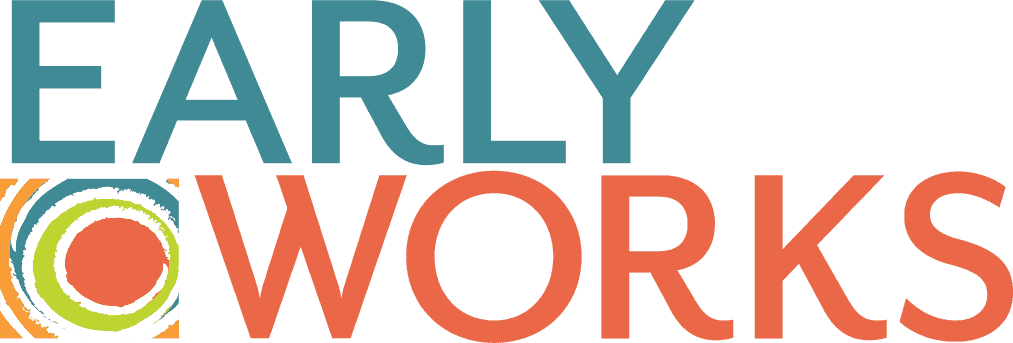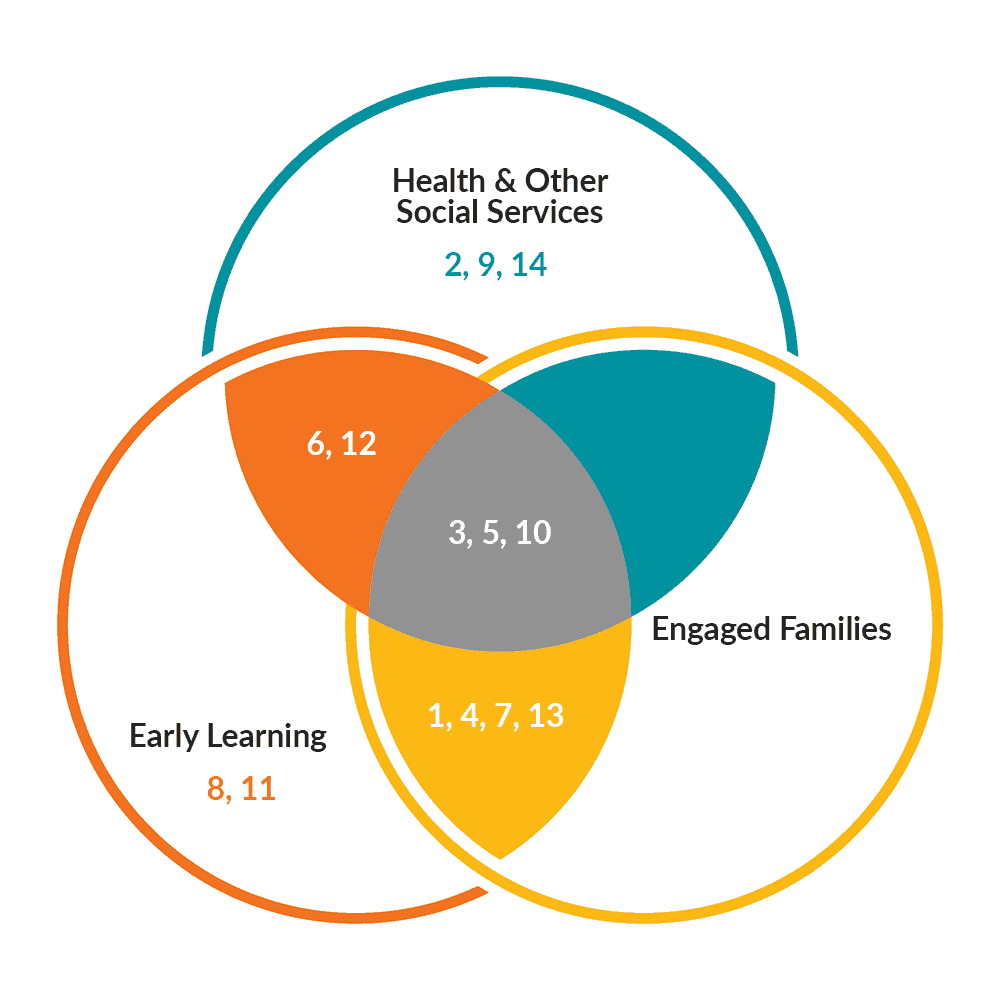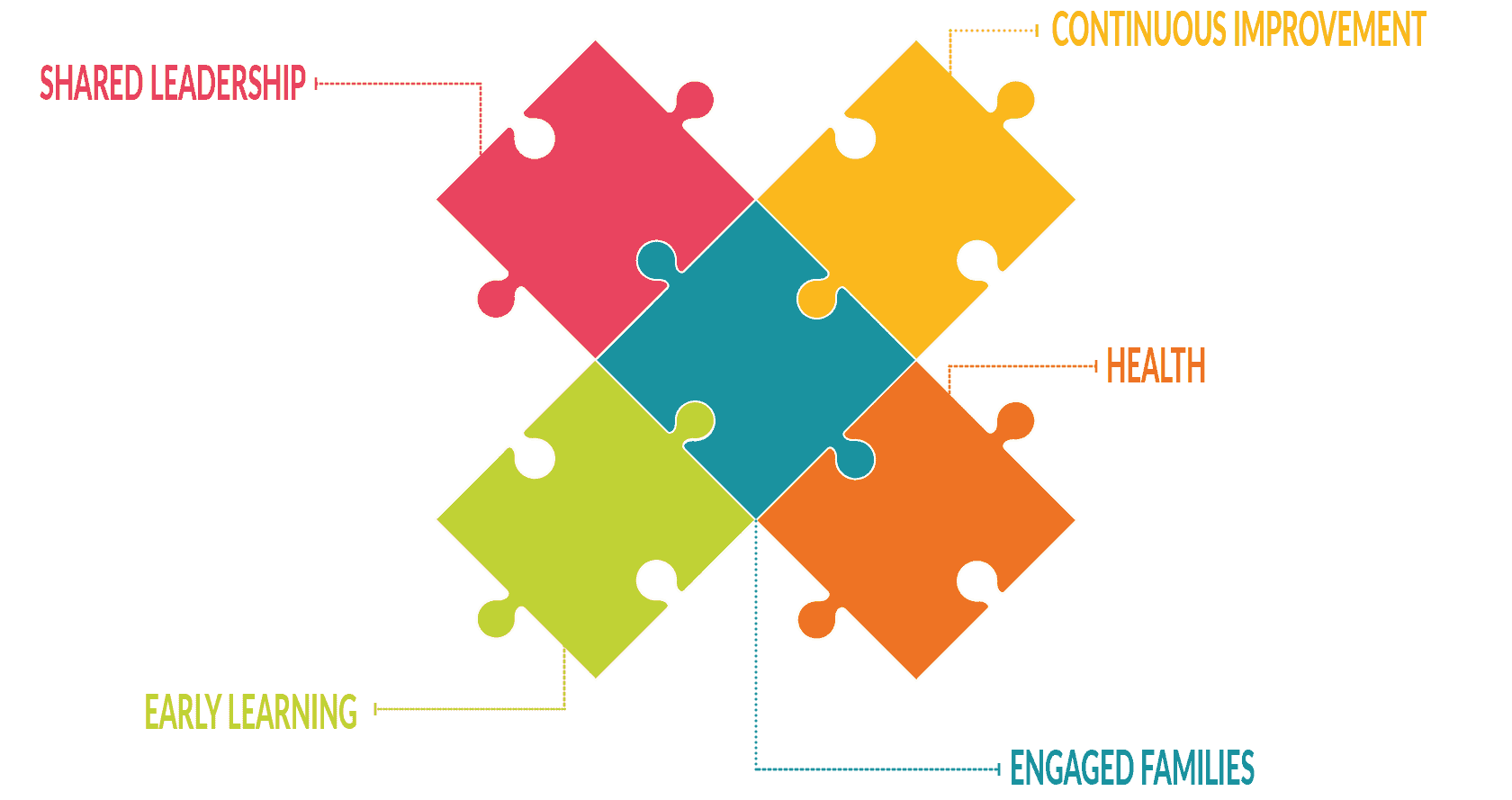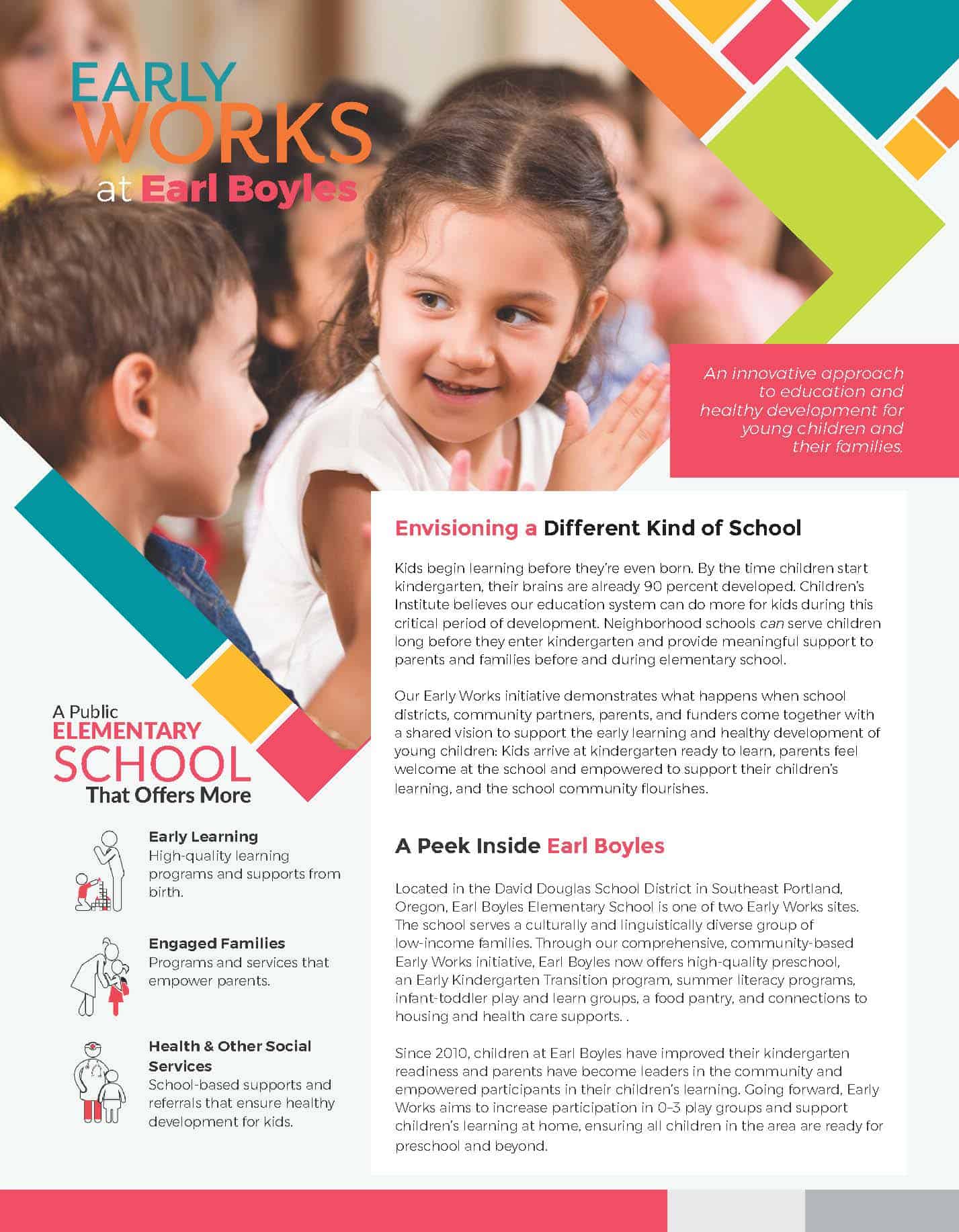
Early Works at Earl Boyles Elementary School
Envisioning a Different Kind of School
Kids begin learning before they’re even born. By the time children start kindergarten, their brains are already 90 percent developed. Children’s Institute believes our education system can do more for kids during this critical period of development. Neighborhood schools can serve children long before they enter kindergarten and provide meaningful support to parents and families before and during elementary school.
Our Early Works initiative demonstrates what happens when school districts, community partners, parents, and funders come together with a shared vision to support the early learning and healthy development of young children: Kids arrive at kindergarten ready to learn, parents feel welcome at the school and empowered to support their children’s learning, and the school community flourishes.

A Peek Inside Earl Boyles
Earl Boyles Elementary School in the David Douglas School District became the first Early Works site in 2010. Initially designed as a 10-year initiative, the project ended in 2023. The school continues to serve many culturally and linguistically diverse families and offers high-quality preschool, an Early Kindergarten Transition program, summer literacy programs, infant-toddler play and learn groups, a food pantry, and connections to housing and health care supports.
Initiative Timeline

The community approves $3.5 million bond measure to fund the construction of a new early learning wing at Earl Boyles.
CI raises $3.5 million in a capital campaign to raise the additional funds to support the construction for the Earl Boyles Early Learning Wing.
The Richard C. Alexander Early Learning Wing opens; Earl Boyles offers six half-day preschool sessions, serving 102 students.
- Fall of 2011:
CI and PSU’s Center for Improvement of Child and Family Services conduct a Community Needs Assessment. - Spring of 2012:
The community approves $3.5 million bond measure to fund the construction of a new early learning wing at Earl Boyles. - Spring of 2013:
CI raises $3.5 million in a capital campaign to raise the additional funds to support the construction for the Earl Boyles Early Learning Wing. - Winter of 2013:
Construction on the Earl Boyles Early Learning Wing begins. - Fall of 2014:
The Richard C. Alexander Early Learning Wing opens; Earl Boyles offers six half-day preschool sessions, serving 102 students. - Spring of 2015:
CI supports school-wide professional development on the Parent-Teacher Home Visit project (PTHV) model. - Fall of 2015:
Multnomah County provides initial funding to launch and staff key components of the Neighborhood Center to meet the needs of the district-community. - Fall of 2017:
Home Forward partners with Earl Boyles and IRCO to offer short-term rent assistance to support housing stability for Earl Boyles families. - Winter of 2017:
CI and Health Share fund Community Health Worker training for Community Ambassadors.
An Initiative Based on Partnerships
The Early Works initiative brings together parents, schools, and communities to meet the needs of children from birth to age 8. Many partners, including the David Douglas School District, Mt. Hood Community College Head Start, and Multnomah Early Childhood Program, have come together to provide high-quality early learning programs and supports starting at birth, parenting education to engage families, and health supports and other social services for families. Children’s Institute provides the vision and leadership for the initiative and Portland State University conducts ongoing assessments.
- Children’s Book Bank
- Home Forward
- Immigrant & Refugee Community Organization (IRCO)
- Latino Network
- Metropolitan Family Services (MFS)
- Mt. Hood Community College Head Start
- Multnomah County Library
- Multnomah Early Childhood Program (MECP)
- Oregon Food Bank
- Padres Unidos (Parents United)
- Reading Results
- Rose Community Development
- SMART (Start Making a Reader Today)
- Zenger Farms

Vídeo disponible en español → AQUÍ

Having rich early learning programs and services in my school means kids are better prepared for kindergarten. This is possible thanks to deeply connected partners, including parents, all working together toward the same goals.
Ericka Guynes
Principal, Earl Boyles Elementary School
Vídeo disponible en español → AQUÍ
Strategies that Drive Change
Informed by research and guided by local data and community input, Early Works demonstrates a new approach to supporting families and young children. This includes offering early learning experiences that are aligned with elementary school so that kids transition seamlessly from preschool into kindergarten and beyond. The initiative provides early learning and health supports while engaging families and sharing leadership amongst a variety of stakeholders.

Early Works is about bringing people together to create solutions for children and their families. We’ve seen that providing a variety of programs and services to kids and families starting at birth can make a difference. We’re using what we’ve learned from Early Works to change the way early learning is delivered across the state.
Kali Thorne Ladd
CEO of Children’s Institute

- Neighborhood Center
- Preschool Operations Committee
- Family Engagement Team
- Summer Learning Team
- Service Coordination Committee
- Ongoing program evaluation that looks at child and family outcomes and system-level changes
- Community needs and health assessments
- Connections to health and dental care
- Developmental screenings and referrals
- Connections to housing support
- Programs that develop parent leaders
- Parent-teacher home visits
- Culturally relevant and inclusive services
- Family partnerships to reduce chronic absence
- Infant and toddler play groups
- School-based preschool
- Early Kindergarten Transition program
- Summer literacy program
- Professional development
Shared Leadership
- Neighborhood Center
- Preschool Operations Committee
- Family Engagement Team
- Summer Learning Team
- Service Coordination Committee
Continuous Improvement
- Ongoing program evaluation that looks at child and family outcomes and system-level changes
- Community needs and health assessments
Health
- Connections to health and dental care
- Developmental screenings and referrals
- Connections to housing support
Early Learning
- Infant and toddler play groups
- School-based preschool
- Early Kindergarten Transition program
- Summer literacy program
- Professional development
Engaged Families
- Programs that develop parent leaders
- Parent-teacher home visits
- Culturally relevant and inclusive services
- Family partnerships to reduce chronic absence
Neighborhood Center Nurtures Community and Connection

From the beginning, Early Works’ goal was to provide high-quality early learning opportunities for young children before they started kindergarten, alongside meaningful support for parents and families before and during elementary school. Early Works also sought to enrich the school community by bringing together existing community resources through the Neighborhood Center, a full-service resource hub for children and their families, which is housed inside of the school.
Now, the Neighborhood Center is a collective of parents, service providers, community organizations, early learning partners, and policy and advocacy groups, working together to support child development and nurture healthy, stable families. It offers resource connection for families seeking rent and utilities assistance, basic necessities, systems navigation, parent education opportunities, and access to community health workers.
The purpose of this report is to demonstrate the significant power of such a program, as well as the challenges, learnings, and emerging best practices around it.
Community Health Workers In Action
(Still it’s unclear what the future of Earl Boyles Elementary community health work will look like. What is certain is that the position and group of ambassadors have become a critical part of the school, and that the staff have come to depend on it. Earl Boyles Principal Ericka Guynes is hopeful the community ambassador program in particular will become stronger and grow to include even more representatives from other backgrounds in the community.
While community health work is a growing profession, most such workers are not working in an educational setting full-time, nor is there a well-established pathway to placing a CHW in a school, in Oregon or nationally. The process of establishing a full-time CHW and volunteer team of community ambassadors at Earl Boyles Elementary has spanned a number of years and demanded innovation. And while the program has been a success, its future is still precarious.
The purpose of this report is to demonstrate the significant power of such a program, as well as the challenges, learnings, and emerging best practices around it.
Download Community Health Workers In Action (PDF)
A Closer Look at Earl Boyles
%
75% of entering kindergarteners had preschool experience.
%
80% of students qualify for free or reduced-price lunch.
%
38% of students meet third grade math benchmarks.
%
24% of students meet third grade English benchmarks.
%
33% are English language learners.
%
88% of students attend on a regular basis.
The Impact of Early Works: 2011–19 Evaluation Highlights
+ Families at Early Boyles appear to be increasingly stable and less mobile since the start of Early Works. Students in more recent cohorts were significantly more likely to remain at Early Boyles for first through third grade.
96% of the 2017 cohort and 98% of the 2016 cohort returned for first grade while only about 84% of students returned for first grade in years prior.
+ Children identified earlier for EI/ECSE services and who received two years of EB preschool were less likely to need special education services by first grade.
Only 66% of former EB Preschoolers who received SPED in kindergarten remained in SPED in first grade, while 82% of the kindergarteners who did not attend EB preschool remained in SPED in first grade.
+ Stronger early literacy skills at kindergarten entry predicted higher third grade literacy, math, and writing scores, underscoring the effectiveness of preschool.
+ Early literacy skills for children in kindergarten, who attended the Earl Boyles preschool, have improved significantly over time (133% increase over baseline) and exceed those in the district and state.
+ Significant early literacy skill gaps between Asian, Latino, and white kindergarteners at the start of kindergarten are no longer present.

